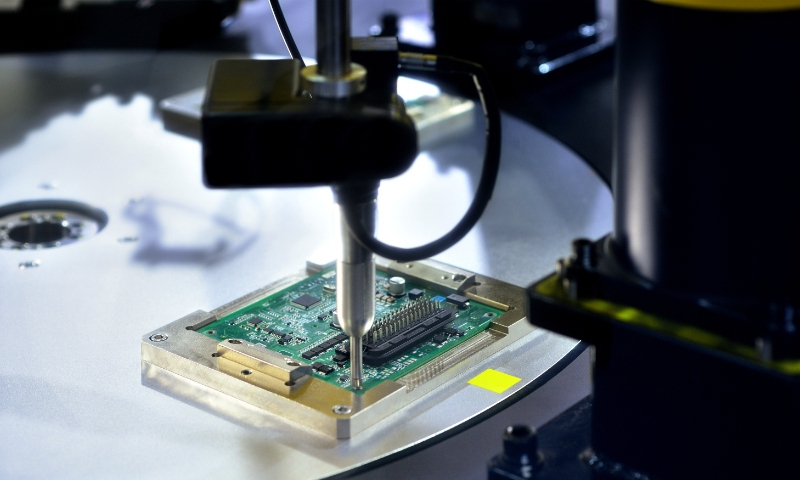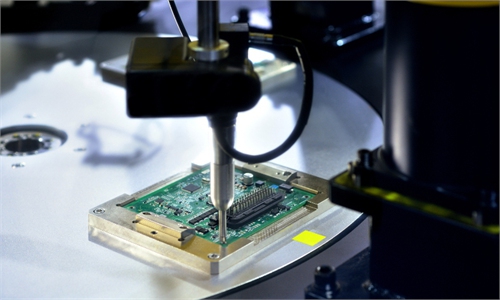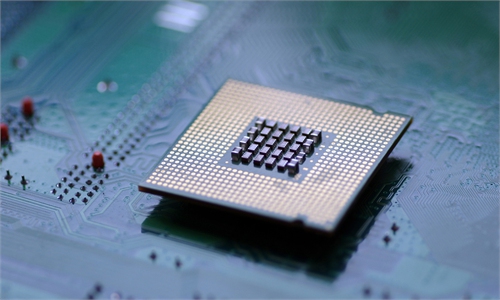China's Big Fund invests heavily in semiconductors as nation speeds up efforts to make breakthroughs
Nation speeds up efforts to seek breakthroughs in key technologies amid US containment

Production of semiconductor chip File photo: VCG
China's second phase of the National Integrated Circuit Industry Investment Fund Co, also known as "Big Fund II," has recently invested heavily in semiconductor design, equipment, manufacturing and key links. Chinese observers said that the move is set to strengthen China's semiconductor industry chain to achieve greater self-reliance and break containment and suppression by the US at an early date.
The registered capital of semiconductor producer Shanghai Huali Microelectronics Corp has risen to about 28.4 billion yuan ($4 billion) and Big Fund II has become its shareholder, according to domestic data provider Tianyancha.
Since its establishment in 2019, Big Fund II has invested more than 60 billion yuan in more than 40 semiconductor firms, domestic media outlet Securities Times reported on Tuesday.
Hangzhou Silan Microelectronics Co, a semiconductor and integrated circuit designer and manufacturer, announced in November that Big Fund II plans to invest 1.5 billion yuan to subscribe to the company's shares. According to the company's financial results, Big Fund II was the company's second-largest shareholder as of the third quarter, having more than a 5 percent stake.
Compared with the first phase, which focused on chip manufacturing, Big Fund II seems to have increased investment in key links of the industry chain, including chip design, equipment, components and raw materials, Fu Liang, an independent tech analyst, told the Global Times.
By strengthening the entire chip industry supply chain, there are growing opportunities and possibilities of breaking bottlenecks as soon as possible and meeting domestic demand, Fu said.
He said that the fund may also step up investment in applications such as 5G, artificial intelligence (AI) and smart cars in tandem with the country's emerging industry development strategy.
China is speeding up efforts to achieve greater self-reliance in science and technology, amid the continuous US escalation of its blockade in the semiconductor and other high-tech sectors.
In mid-October, the US Commerce Department said that it would halt exports of AI chips, making it tougher for US firms including Nvidia and Intel to sell existing products in China or to introduce new chips to circumvent the rules, the Wall Street Journal reported.
In addition, the White House recently announced policies to strengthen US semiconductor supply chains and further implement its CHIPS and Science Act for so-called national security, through closed and exclusive small circles.
Any attempt to decouple the global supply chain will do more damage to foreign chip companies, especially US ones, while pushing China to make progress in the domestic manufacturing of advanced semiconductors, Xiang Ligang, the director-general of the Beijing-based Information Consumption Alliance, who closely follows the chip industry, told the Global Times on Tuesday.
China's domestic supply stands at about 25 percent of its total consumption this year and will rise further amid technological breakthroughs, Xiang said.
The release of Huawei Mate 60 smartphones and 910B Ascend AI chips proved that Washington's crackdown on Chinese tech firms was ineffective, he said, noting that the West has underestimated China's resolve and capability of achieving tech self-reliance.
"Foreign chipmakers should do their best to cooperate with Chinese enterprises and expand investment in the world's largest electronics consumer market so as to ensure their market share," he said.
Jensen Huang, CEO of US chipmaker Nvidia Corp, said at an event in New York on Thursday, "We have to come up with new chips that comply with the regulation, and once we comply with the regulation, we'll go back to China," Bloomberg reported.
"We try to do business with everybody we can. On the other hand, our national security matters. Our national competitiveness matters," Huang said.
Despite a harsher external environment, China's semiconductor industry will overcome challenges and achieve long-term, sustainable growth on the back of a vast domestic market, consistent input in research and development and determination to achieve breakthroughs in core technologies, analysts said.
"China has been accumulating technology in all aspects of semiconductor manufacturing. With the addition of more capital and talent, the nation is set for key technological breakthroughs," Fu said.



